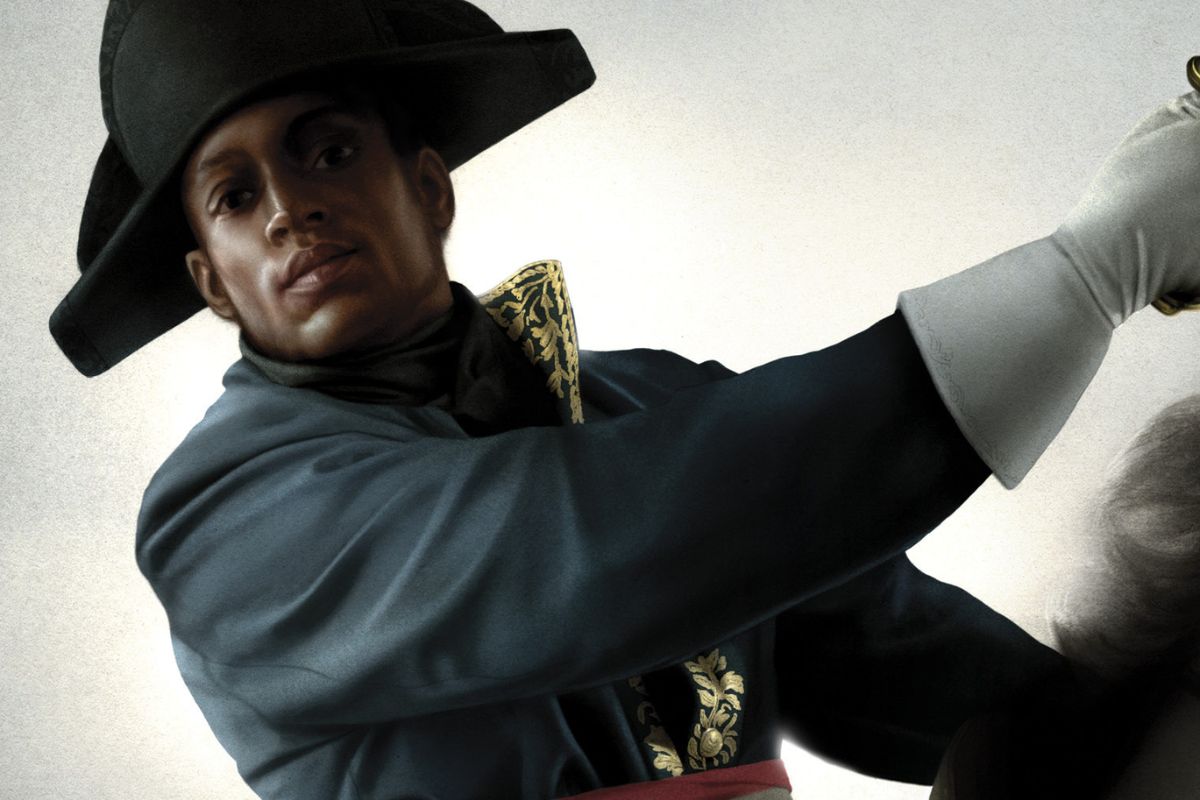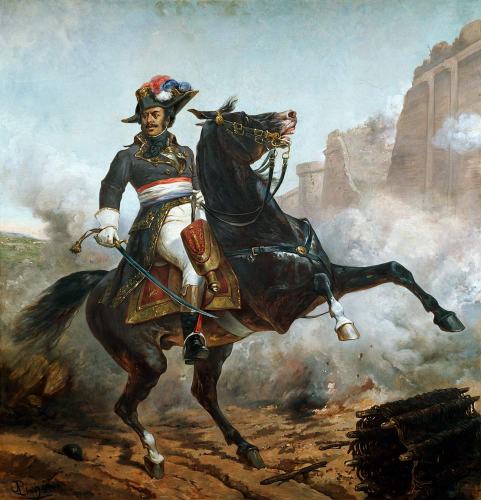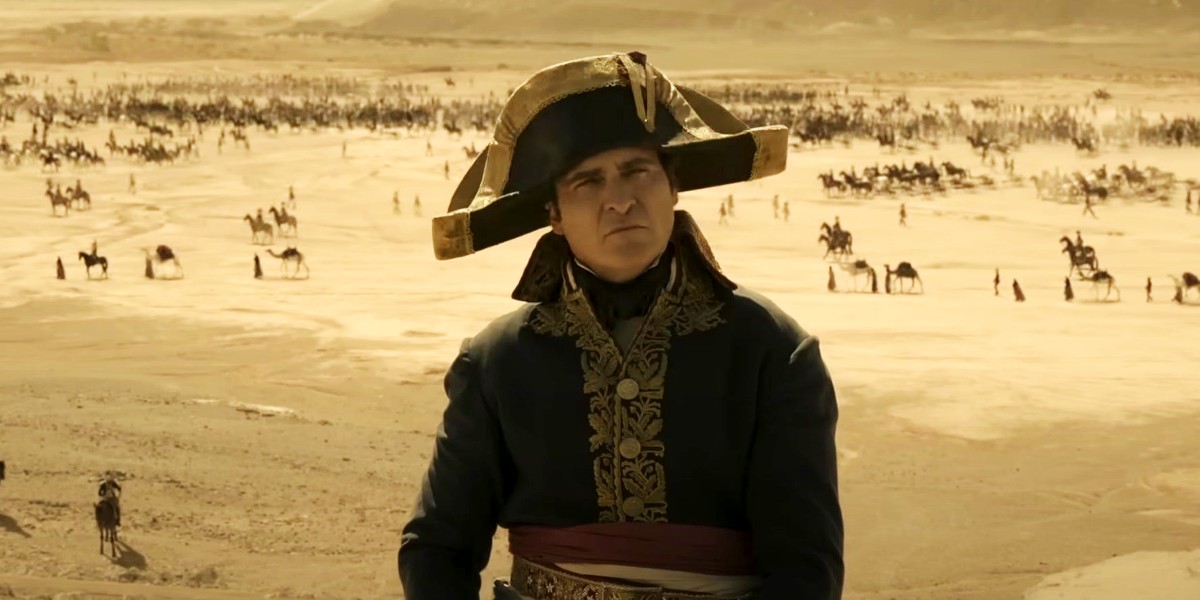Did You Notice ‘Napoleon’s Subtle Connection to One of France’s Most Popular Authors?

One of the most under-discussed historical figures present in Ridley Scott’s epic reimagining of Napoleon’s life is General Thomas-Alexandre Dumas Davy de la Pailleterie. If that name sounds kind of familiar, it’s because his son and grandson would become world-famous French writers.
Small spoilers for Napoleon.
In many scenes featuring Napoleon with his generals and troops stands Abubakar Salim playing Thomas-Alexandre Dumas. Outside of one scene in Egypt, the general is pretty quiet and reserved. However, if you have any knowledge of Dumas’ history with his peer-turned-emperor-turned-foe Napoleon or his family, you probably got as excited as I did seeing him in the theater.
Born to an enslaved Black mother and her enslaver (also an Alexandre) in the French colony of Saint-Domingue (now Haiti), Dumas was born enslaved in 1762. His father sold his mother and siblings to pay for his own passage to Europe before bringing Dumas later, at age 14. In France, his father had Alexandre-Dumas educated. With a titled family, Alexandre-Dumas lived very well until they had a falling out in his mid-twenties after his father married a servant. With his allowance and leisure money limited, Alexandre-Dumas joined the military.
Dumas wasn’t the only major black figure in the French military at the time. One example of another person that’s not in the movie is Joseph Damingue (a.k.a. Hercule). Hercule commanded an all-Black unit of nearly 1,000 troops (Bataillon des Pionniers Noirs) mostly during Napoleon’s campaign through the Kingdom of Italy. There was also Joseph Serrant and Władysław Franciszek Jabłonowski, and Toussaint L’Ouverture (pre-Haitian Revolution.) However, none would reach the heights of Dumas. He became one of the most important generals in European history, and his descendants are among the nation’s most celebrated artists.
Thomas-Alexandre Dumas and the Dumases

Despite his noble parentage, Alexandre-Dumas was biracial and began as a private, working his way up the military ladder. He served in many integrated and segregated battalions, including one nicknamed after former mentor and Black French icon, Chevalier. Alexandre-Dumas gained respect for his military prowess and, later, republican values. That allowed him to survive the French Revolution and Reign of Terror that followed. Within ten years, Alexandre-Dumas married Marie-Louise and got the attention of Napoleon. Napoleon appointed him as a top general in France’s military campaigns across Northern Italy and Egypt. At one point, the four-star general oversaw 50,000+ mostly white French troops.
They had a rocky relationship. For one, the general disagreed with Napoleon allowing troops to seize land during conquests. While not shown in the movie, Napoleon fought to reinstate slavery in the Caribbean to boost France’s economy. (He eventually did, and it stayed legal in French territories for over 40 years.) That relationship ended very sour, with Dumas captured by Naples-based enemies for two years. Following Napoleon becoming Emperor, another general freed Dumas. For the last few years of the general’s life, he lobbied to get back pay and enlisted again, but failed.
Not only was that hard, with Dumas at odds with Napoleon, but the laws for Black people (and all women) in France regressed. With the lack of money during his last few years alive and France refusing to give Marie-Louise her military widow pension, the family struggled in poverty after he died from cancer. Marie-Louise raised their twelve (Marie-Louise) and three year old (Dumas) alone. Author Dumas was a young child when his father died. So, while his father was a larger-than-life figure, young Dumas probably got slightly exaggerated stories of Dumas.
In Tom Wiess’ Pulitzer Prize-winning 2012 book, The Black Count: Glory, Revolution, Betrayal, and the Real Count of Monte Cristo, Wiess found that Dumas used family history, true crime in broadsheets, and his imagination to come up with many of his iconic works. This includes works like The Three Musketeers and The Count of Monte Cristo. For example, historians believe the island where Edmond finds the treasure is connected to a sugar smuggling story of his grandfather in present-day Haiti, and the treasure itself is derived from a stash “found” by his father in Egypt. Even a disdain for Napoleon comes through in that novel. Dumas’s other descendants include another esteemed author/playwright and an Olympic gold medalist in fencing.
A quiet presence of French colonialism decorates Napoleon

While an interesting figure worthy of recognition and study, it’s important not to put Dumas up on a pedestal. After all, he was a general during French colonial conquest, and that’s something Scott got right in Napoleon. Dumas served as the top figure over cavalry units during Napoleon’s “Orient” campaign. For example, in 1798, Egyptians in Cairo rose up against French occupation and taxation. In retaliation, Napoleon deliberately fired at and then desecrated the Grand Mosque of al-Azhar. Philip Dwyer’s 2009 book Napoleon: The Path to Power details this.
They plundered whatever they found in the mosque, such as furnishings, vessels, […] They treated the books and Koranic volumes as trash, throwing them on the ground, stomping on them with their feet and shoes. Furthermore, they soiled the mosque, blowing their spit in it, pissing and defecating in it. […] And whoever they happened to meet in the mosque they stripped. They charged upon someone in one of the [students’ residences] and slaughtered him.
pages 402-405
Reiss shared letters of Dumas to Napoleon describing what it was like to charge into the mosque on horseback. Napoleon saw Dumas as so instrumental to quelling the insurrection that he promised a painting of him. However, when that painting finally came, Napoleon chose to make Dumas white. While Dumas expressed similar anti-Arab racism as his fellow Frenchmen, he also hated the fact that slavery was still legal in the region. Despite its illegality in France, Napoleon kept slavery in Cairo to stay in good graces with locals in power. In 1912, France would erect a sculpture by artist Alphonse Emmanuel Moncel de Perrin of Dumas. However, the Nazis melted it down in 1941 when they took over France. The Alexandre Dumas museum holds salvaged bits and a copy of the head cast from de Perrin’s molds.
This moment in Egypt and Dumas’ presence isn’t the only connection to colonialism in the film. The long-time lady’s maid to Napoleon’s wife, Joséphine (Vanessa Kirby), serves as another reference. We hear Lucille (Riana Duce) speak in a Caribbean accent that I can’t pin down. During Joséphine and Napoleon’s coronation, Napoleon refers to Joséphine as being from Martinique, which is now a former French colony in the Caribbean.
Historians debate whether or not she was born here or next door in present-day Saint Lucia. Regardless, Joséphine spent her early years here as the child of an enslaver and plantation owner in Martinique. She also returned to the plantation with her children in her 20s while temporarily separated from her first husband. Enslaved people’s fight for independence sent her packing back to France. Lucille serves as a visual reminder of the Empress’ wealth and connection to slavery.
If you haven’t already seen Napoleon, please don’t go to see this movie just because of Dumas’s presence. Not only is it very minor, but I don’t even think his name is said aloud during the film. I just knew it was him because I have a fascination with this historical figure and felt validated seeing “General Dumas” appear in the credits. Still, I loved this inclusion! For one, the Dumas family is such an important part of French history. His son and Victor Hugo are among France’s two most beloved literary authors. However, most importantly, it serves as a reminder that Black people were most certainly in Europe for centuries. Fictional vampire shows and epic (albeit not the most historically accurate for other reasons) biographical dramas both remind everyone of that fact.
(featured image: Crown Publishing Group/Sam Weber)
The Mary Sue may earn an affiliate commission on products and services purchased through links.
Have a tip we should know? [email protected]
